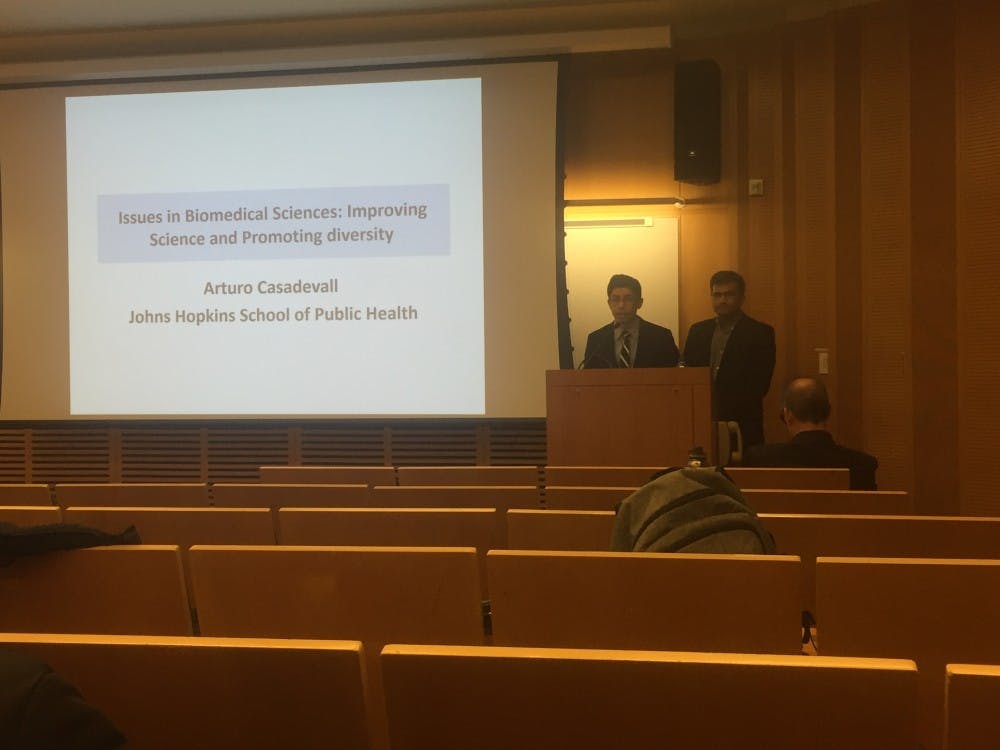Bloomberg Distinguished Professor Arturo Casadevall gave a talk titled “Promoting Diversity and Inclusion in the Research of Health and Medicine” hosted by the Osler Medical Symposium on Tuesday. Casadevall is chair of the Immunobiology and Molecular Microbiology departments at the School of Medicine.
His talk focused on the biases and inequality present in the field of research.
Casadevall discussed the use of lottery systems, which are widely used mechanisms for making difficult decisions, in publishing research articles.
“Lotteries are fair systems provided that they are random. The current systems are already lottery systems, but they do not have the benefits of being random,” he said. “One of the major problems is political, in convincing administrators and politicians to accept the data.”
Casadevall said that concerns don’t end with getting published. He explained that research papers may be removed after publication by a process called retraction. He explained retractions could either be the result of good or bad intentions.
“The good thing is that it is a mechanism of correcting literature. Sometimes there are obvious errors,” he said. “People should be encouraged to retract the literature.”
However, he said that bad retractions are those caused by dishonestly or bad data. He found that errors occur in one out of every 25 papers.
“We now know that most of these are [true] errors, but some of them cannot be errors because when you begin mirroring an image or flipping it around by 180 degrees, that is deliberate intent to change it,” he said.
Furthermore, Casadevall touched on the gender disparities present in the research field.
As a former program chair for the American Society of Microbiology, he noted that at regular meetings, the number of female speakers was fixed at around 30 to 35 percent regardless of the number of women attending the meetings.
According to Casadevall, gender inequality is a real problem in some scientific fields. He said that women are listed as the primary author of an article fewer times than men, even in cases where each author contributed equally.
Casadevall answered questions from the audience after his presentation.
One student inquired about how the lottery system fits into the scientific community’s emphasis on publishing the most impactful or sensational articles.
In response, Casadevall connected the focus on impact to other areas.
“These problems are all related. When you go to work, or go to study section or to a review group, the culture is impacted,” Casadevall said. “When it comes to humans, the hardest thing to change is culture. You need to find ways around it that basically maximizes the good things of a culture and minimize the problems.”
He then compared the system of selecting articles for scientific journals to dividing them between two different stacks.
“One of the things we know about data is that scientists have gotten pretty good at giving you two piles,” he said. “The problem is when you take one pile and you say it’s right. When you rank, that is where all the biases come from.”
Casadevall also responded to another student who asked if the problem of fewer female-authored articles is due to a lack of women involved in research.
“We are able to control for that — there are more women in research,” Casadevall said. “We look at when men and women collaborate... Statistically, we should have found a 50/50 relationship, but the problem is that there was a disequilibrium.”
Junior Vijay Ramasamy reflected on how this talk exposed the prevalence of misinformation in scientific literature.
“The specific example he gave about photographs, images and graphs along with the prevalence of mischaracterized and falsified information is really stunning,” said Ramasamy.
Ramasamy added that the work Casadevall has done around gender disparities is important.
“It definitely gave me a new perspective on scientific literature and the importance of learning more about how to write and publish good articles,” he said.





